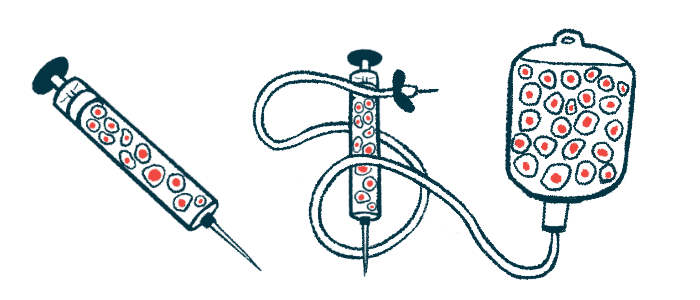Low-dose TED-A9 cell therapy eases Parkinson’s motor symptoms: Study
In study, 12 adults received either low or high dose in single transplant

The first three Parkinson’s disease patients who received a low dose of TED-A9, an investigational stem cell-based therapy being developed by S.Biomedics, saw reduced motor symptoms after a year without any reported side effects.
The results come from a small Phase 1/2 clinical study (NCT05887466) where 12 adults with a diagnosis of Parkinson’s for five or more years received a single transplant of TED-A9, at either a low or high dose, directly into the brain.
“The clinical results demonstrated very promising efficacy,” Dong-Wook Kim, MD, PhD, a professor at Yonsei University College of Medicine in Seoul, South Korea, and chief technology officer at S.Biomedics, said in a company press release.
Six patients were assigned to receive TED-A9 at 3.15 million cells and another six received a high dose containing 6.3 million cells as part of the company-sponsored study at Yonsei University’s Severance Hospital.
None of the patients had short-term complications or dose-limiting toxicity. In the first three patients in the low-dose group, who’ve been followed for a year, “no adverse issues related to transplant surgery or cell safety were observed,” Kim said.
The company plans to share results from the first three patients who received the high dose later this year, as they complete a year of follow-up. The study should conclude in early 2026, but safety will continue to be monitored for five years.
Replacing neurons lost to Parkinson’s disease
Parkinson’s occurs due to the gradual death of dopaminergic neurons, the nerve cells in the brain that produce dopamine, a chemical involved in motor control. A shortage of dopamine results in motor symptoms, which typically include slowness of movement, tremor, and stiffness.
TED-A9 is an investigational therapy consisting of dopaminergic neuron precursors derived from human embryonic stem cells. These precursors are generated in a laboratory and have the potential to differentiate into various cell types under appropriate conditions.
The therapy is surgically implanted into the brain’s putamen region, where the precursors should mature into functional dopaminergic neurons. The approach is intended to alleviate the motor symptoms associated with Parkinson’s disease by replacing lost neurons.
Preclinical studies in lab-grown cells (in vitro) showed that clinical-grade embryonic stem cells can indeed mature into viable, functional dopaminergic neurons. And, when transplanted in vivo into the brain of rats modeling Parkinson’s, TED-A9 eased motor symptoms.
A year after receiving a low dose of TED-A9, the first three patients showed a mean decrease of 12.7 points in the Movement Disorders Society-Unified Parkinson’s Disease Rating Scale (MDS-UPDRS) part III, from 61.7 to 49 points. Higher scores in the MDS-UPDRS part III indicate more severe motor symptoms.
To enter the study, patients were required to maintain a stable dose of levodopa for at least three months before enrolling. Despite adhering to this regimen, all the participants experienced a daily wearing off of levodopa’s effects for at least two hours, these being the return of symptoms or episodes of freezing of gait, during which they were unable to move. TED-A9 eased both wearing off and gait freezing.
Imaging studies revealed an increase in the number of dopamine transporters, the proteins that pump dopamine into neurons, suggesting the stem cells had engrafted, or matured to rebuild the pool of dopaminergic neurons.
“The results are believed to align closely with the findings from our preclinical in vitro and in vivo studies. We are excited that TED-A9 could be a fundamental treatment that directly replaces dopaminergic neurons lost in patients with Parkinson’s,” Kim said.







